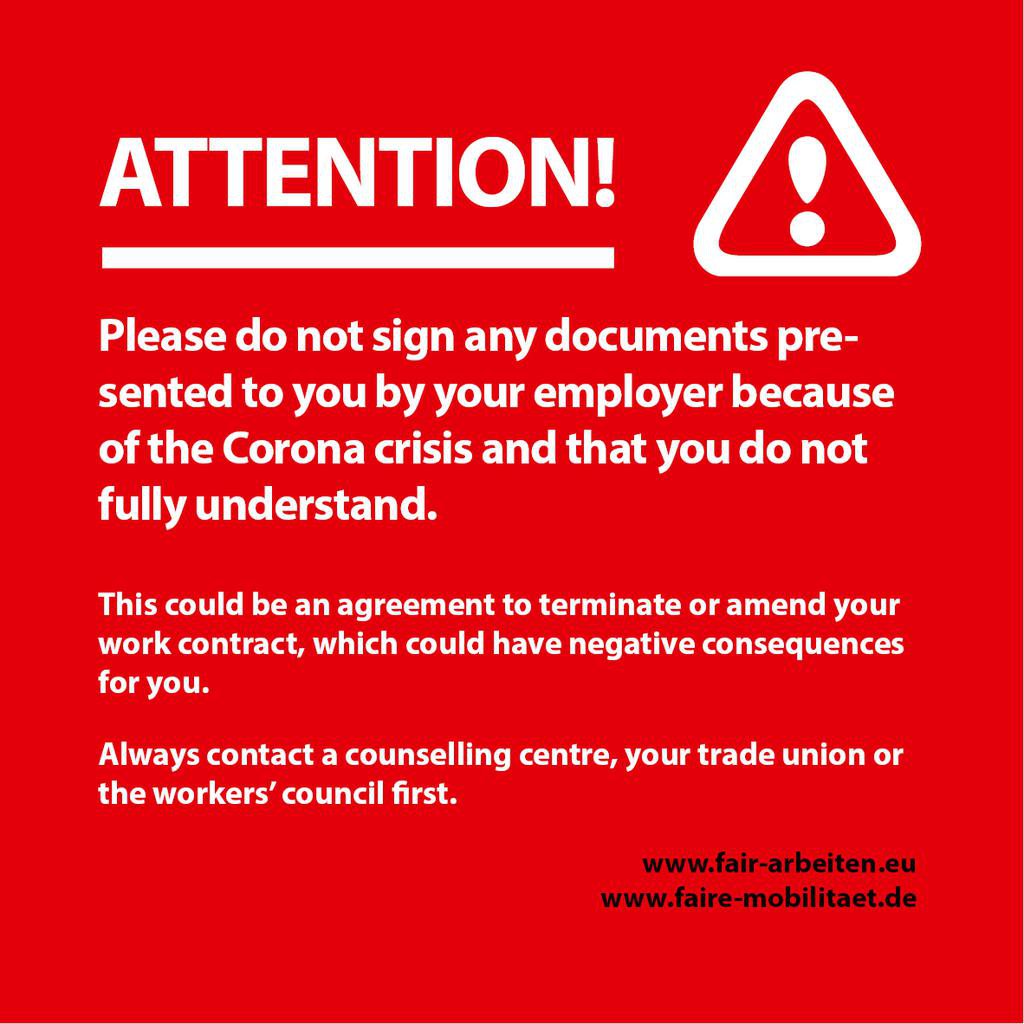Coronavirus is affecting all the people in Germany. Many are unable to go work for various reasons. What are the rights of workers in Germany during this pandemic? Must they go to work? What happens if a worker is infected or fears being infected? This guide answers all your questions.
When can you stay at home?
There is no simple answer. You can’t decide on your own not to go to work because your fear being infected with Coronavirus. If you decide on your own, your employer can give you a warning notice or terminate your contact in response.
If you had contact with a person infected with the Coronavirus, clarify as soon as possible whether you have to be quarantined. If it is necessary to stay away from your workplace due to a medical suspicion of Coronavirus, you must inform your employer immediately and submit a certificate of incapacity to work.
According to the regulations, all persons infected with the Corona virus must be reported to the public health department by the doctor treating them. In the case of quarantine, you must stay at home and your wages will be paid by the employer as before.
In principal, when you are sick and unable to work – due to the Coronavirus or something else – you receive a certificate of incapacity to work from your doctor, which you must send as soon as possible to the employer and the health insurance company. In this case, you will continue to receive your salary.
Due to the current situation, until 23 June 2020 it is possible to get a 14-day certificate of incapacity from a doctor by calling on the phone only, without a personal check-up. You will get the certificate by post to your home.
However, this is only valid for:
– Patients with respiratory diseases showing light symptoms
– Patients with respiratory diseases showing light symptoms, if also the suspicion of having contacted the virus exists
You were diagnosed with the Coronavirus.
You must inform your employer immediately you are informed that you are infected with coronavirus. You must also provide proof of the expected duration of the illness by means of a certificate of incapacity to work. In order to minimise the spread of the virus, it would be good to inform your employer and colleagues about the infection.
What happens, if there is a person infected by Coronavirus in the company?
Even in this case you can’t decide on your own to stay at home. If you have had contact to an infected person, the health administration body (“Gesundheitsamt”) will contact you and send you into quarantine. In this case, you continue to receive your salary (according to § 616 BGB or § 56 IfSG).
You need to travel for business to an area highly affected by Coronavirus. Can you do so?
In principle, the incapacity to work also extends itself to business trips. If the risk of infection in a region has been officially stated by public authorities (public health department, local administration, police and others), you don’t have to travel to that area.
Here you can find the website of the Robert Koch Institute with up-to-date information on risk areas (https://www.rki.de/DE/Content/InfAZ/N/Neuartiges_Coronavirus/Risikogebiete.html).
What if your company has little work due to the current situation?
Employers can apply for the so-called short-time allowance (Kurzarbeitergeld) to the Employment Agency. The employer receives a compensation payment from the state for the share of his employees who work shorter hours due to declining orders, which they must pay out to you. This compensation amounts to 60 percent of the lost net wage. If you have at least one child, you will receive 67 per cent of the lost net wage.
If the employer sends you home anyway, you are still entitled to your wages. Ask the employer to confirm in writing that he is sending you home or make sure that this discussion with the employer takes place with a witness.
Working time accounts may not be used up unilaterally by the employer when he wants to give you time off. Your consent is always required.
If the employer decides to close the business as a precautionary measure, he must continue to pay your wages for the period of the closure.
ATTENTION! Do not sign any documents presented to you by your employer because of the Coronavirus crisis. This could be a dismissal or an agreement to terminate or amend your work contract, which could have negative consequences for you.

If money earned by a side-job or Minijob will be deducted from your allowance or not depends on when you started the side-job.
If you start another job after going on short-time-allowance: If you start another job in the same time or after going on short-time-allowance, the money you earn will be deducted from your allowance. Example your normal salary is 2.400 € brutto. Your work time is reduced and you only get 1.000 € brutto. For the difference between 2400 and 1000 €, which is 1.400 € brutto, the netto sum will be calculated and you receive 60 or 67 percent of that netto sum. If you start another job, where you earn for example 450 € a month, you will only get the short-time-allowance on the basis of a brutto salary of 950 €.
In this case, it is irrelevant if the new job is done during times when you would normally work or during times when you would normally be free (like weekends). Neither does it matter if it is a Minijob or a job with social insurance obligation. The rule is valid for self-employ
Exception: Since 27 March 2020, if your new job is in a so-called system relevant area (hospitals, pharmacies, food industry, etc.), the money you earn will not be deduced from your allowance, unless your new salary together with your allowance exceeds your old salary. If you want to start a side-job, you have to inform your employer. He is entitled to forbid this in case of disloyal competition.
If you have had your side-job before going on short-time-allowance: in this case, the money earned from the side-job will not be deducted from your allowance.
What if you cannot reach your place of work due to the current situation?
It is upon you to get to work. If you fail to do so the employer can send you a written disciplinary notice or in some cases even a dismissal, and he must not pay your salary.
Whether you can be dismissed or not depends on many factors. If your employer tries to dismiss you, you should challenge the dismissal in court.
The law protecting against unlawful dismissals is only valid if the company has at least 10 employees and if you have already worked at the company for more than 6 months. If this is not the case, it is hardly possible to defend yourself against a dismissal. Seek help from a counselling centre or a lawyer.
If you are unable to get to work, you should inform your employer immediately and try to discuss the situation with him.
Your employer has dismissed you – you have signed a document that you did not understand
Check if your dismissal was according to the law. You can protect yourself against an irregular or unjustified dismissal, including in the case of a verbal dismissal or a termination without notice. You can file a claim to the labour court. However, you only have 3 weeks to do so from the day you receive the notice of dismissal!
Here you can find an example for such a claim, which you can submit to the legal application office of the local labour court in order to comply with the 3-week period! (Klagemuster_Kuendigung_ODER_Aufhebungsvertrag-ausfuellbar.pdf (PDF, 49 kB)
More information about dismissal can be found under https://www.faire-mobilitaet.de/-/4mP.
Regardless whether you have received a notice of termination or signed a document presented to you by the employer, you should immediately contact a law firm, your trade union or a counselling centre.
If you have a low income, you can apply to the local district court for a so-called counselling assistance certificate (Beratungshilfeschein), which can be used to consult a lawyer.
You must immediately register yourself as a job seeker at the employment agency or the job centre! Due to the current situation, you can also do this by telephone or online, without an in-person visit! (https://www.arbeitsagentur.de/eservices).

No! You can only be evicted from your apartment following a court ruling. In addition, travel restrictions are currently in place. Under no circumstances should you voluntarily move out of your accommodation, as you will then be homeless and have no right to return. This also applies if you only have a verbal rental contract. If you are put under pressure, contact an advisory centre or the police!
Your enterprise was put under quarantine by the competent authority and ordered to close temporarily. Do you continue to receive your wage even if you are not sick yourself?
In general, you will continue to receive your salary if the employer cannot offer you work. This is also the case for closings by authorities, according to current legislation.
If your child’s kindergarten or school is closed because of the Coronavirus, can you stay at home and continue to receive your wage?
You must search for ways to have your child looked after elsewhere. This is often difficult, especially with small children. You should talk to your employer as soon as possible and consider whether working from home is a possibility. If this is not possible and you have indeed no other way to have your child looked after, then you can stay at home, since you are unable to come to work.
Since 30 March 2020, you can receive a compensation for the lost wages during such cases. It is only valid for children younger than 12 years. You first have to use other means available to you, such as deducting your overtime, or using short-time-allowance payments. The compenstation is 67 percent of your netto salary, but capped at 2.016 € netto a month. The compensation will be paid to you through the employer. You will not get compensation for times when the kindergarten or school would have closed anyway, like school holidays.
If the child falls ill, the usual rules apply: employees can take time off work because the child is ill. The health insurance company will then pay sickness benefit for 10 days, or 20 days for single parents.
What precautionary measures must your employer take to protect you from Coronavirus?
The employer has a duty of care. For example, he must provide disinfectants, if you come in contact with customers. The company must also provide information on occupational health and safety and hygiene regulations and make the necessary resources available.
Guide prepared by Faire Mobilität
